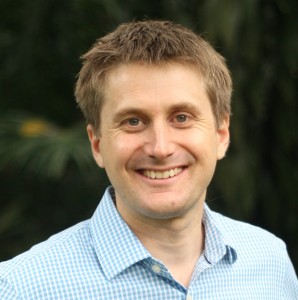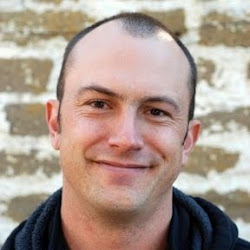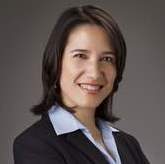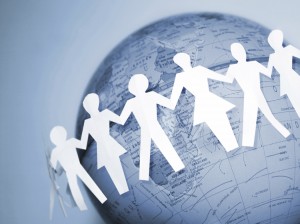Long working hours, extensive international travel, and late night (or early morning) conference calls are often expected of international development professionals. And for those who are raising kids, it can be challenging to balance these demands with the needs of family. To celebrate Father’s Day last week, I asked dads who work in aid & international development to share tips or advice on work-life balance.
As happened when I asked working moms in international development to share their thoughts on their challenges, I heard a wealth of feedback and information. Rather than overwhelm you with it all (who has time to read a long blog post, anyway?) I split it into two blog posts: click here to read Part 1 (published on Father's Day) and read on for Part 2...
Drawing the Line on Travel
International development careers are synonymous with travel, which can pose a challenge to working parents. “The key is to be absolutely clear and up front about what you’re willing to do and not do” in terms of travel, advises Scott Webb, Program Officer at International Relief and Development and blogging at Vox Souley. This means you must “know what your and your family’s capacity is for your travel – how long can a trip be, before it becomes a real burden on everyone.” The impact of a parent’s absence on spouse and kids depends on each family situation, including ages of the children. “We’ve got a 14 month old toddler at home, as well as 8 and 5 year old daughters, and me being gone makes my wife’s life much more physically demanding. One person being away changes the logistics, it’s like adding an extra 35 hours to a parent’s workweek, all the home hours where you can be helpful, not to mention the weekends.”
Trade-Offs
An obvious but still painful fact: dads who work in development can’t travel as much as they did when they were single or when they didn’t have children. “For those without kids or who feel fine being away for 4-12 weeks or longer, it really raises the stakes for those with families,” says Scott. “Also, there may be those who would do whatever it takes, but as soon as they have kids, they start pulling back a little, which is a real adjustment for the die-hard types who used to be able to fly off at the drop of a hat for 12 weeks at a time.”
Scott, who has also written for Devex about being a “daddy aid worker,” has chosen to limit his travel to 25 percent, or 13 weeks of travel per year – which is still a burden on his family. Not traveling more “may genuinely hurt my chances of advancing within my career until either I change the type of position I’m in or my kids grow up a little and I’m more available to travel,” he reflects. “It all comes down to what you and your family decide they can handle, not just financially, but emotionally. My mantra: your kids are young once. Don’t miss it.”
(This scenario may apply just as well to development professionals with aging parents or other personal commitments, but this is a post about dads after all…)
Putting your family first “will absolutely cost you in the workplace,” states J., a 20+ year veteran of aid work, father, blogger at Tales from the Hood, and founder of AidSource, the social network for humanitarian aid & development professionals. “I’m not saying it’ll cause your career to end. But you will eventually have to go against the wishes or directives of your employer, pass up a promotion or job opportunity, tell staff who depend on you that your kids are more important to you than them. Make peace with that reality.”
On the flip side, putting family first also means paying the bills, too, J. points out. “The mortgage, the orthodontist, the cost of soccer uniforms. Family first, but sometimes that means that you have to accept that hardship deployment. Salary doesn’t just magically appear. If you’re an aid worker and your family depends on you for their livelihood, then you have to go to work. Yes, there may be angst and drama at home when the subject of the next move comes up, but this is the cost associated with being an aid worker with family.”
Challenges in the Field
Field-based aid professionals report that they encounter work-life challenges unique to expat life.

“Living an expatriate life means that my wife and two children do not have the support network they would if we lived in our home country,” explains Dan Cooney, Outreach Manager for the Center for International Forestry Research. “We have no family around us. Our friends are great, but we have only known them a short while. That means as the father and husband responsible for bringing my family here (Bogor, Indonesia), I need to provide even more emotional and practical support than I would normally. To make the time to do this is a constant challenge. Thankfully I do not travel as much as many others. Still, my workload is intense and I am constantly having to ensure I am as efficient as possible with my work so that I can leave the office in time each evening to spend some hours with the family before the kids sleep and I pick up my laptop again. Is this challenge unique for expats? No, of course not. However, I feel living in a foreign country does exacerbate it.”

And then there’s the “fish bowl” effect of expat life, where everyone knows everyone else – especially in small countries/postings. This makes the work/family balancing act all the more precarious, reflects a field-based country director of an international organization and dad of two (ages 5 and 2) who preferred to be anonymously referred to as the Cat in the Hat (photo by cambodia4kidsorg). “Whether at a restaurant or on a recreational outing, it’s hard to break away from work – precious emotional space being sucked away, oftentimes without notice. It’s particularly hard when with family and friends as the personal and professional relationships are intertwined, which they often are in development in small countries. With no easy solutions myself to offer, I can say I have been rewarded by getting off the beaten path: getting away for the weekend, finding friends with kids who are not in development or in areas of overlap with my work. I have found my time spent with my family benefits from truly being able to break away, even when we are not alone together.”
Blending Work and Life
Exposing kids to Dad’s job is one way to blend work and life. Chris Herink, National Director, World Vision Myanmar, shared in an earlier post on career highlights of 2011 that he brought his wife and two young sons on a field visit for the opening of a new school. He reports that this helped him answer the question, “What does Daddy do all day?” After all, “Saying ‘local capacity building’ does not really mean much to a 6-year-old. When we talk about a work/life balance, the implicit assumption is that clear boundaries can and should be drawn between the two.” For him, this experience was powerful because “’work’ and ‘life’ intersected in a fun and meaningful way.”
Many thanks to the dads who shared their perspective, and thanks also to those dads who were too busy hanging out with their kids (or jumping on a late-night conference call) to respond. Hats off to all dads working in development for all you do, and I hope you had a very Happy Father’s Day!
Are you a dad (or mom) working in development? What additional thoughts on work-life balance would you add? Please share in the comments or email me by clicking <reply> to this email.










